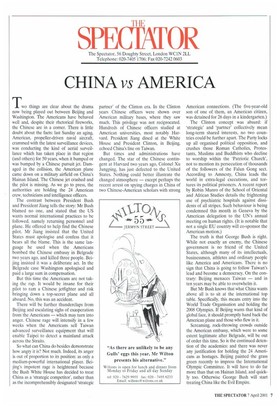CHINA vs AMERICA T wo things are clear about the drama
now being played out between Beijing and Washington. The Americans have behaved well and, despite their rhetorical fireworks, the Chinese are in a corner. There is little doubt about the facts: last Sunday an aging, American, propeller-driven naval aircraft, crammed with the latest surveillance devices, was conducting the kind of aerial surveillance which has taken place in that region (and others) for 50 years, when it bumped or was bumped by a Chinese pursuit jet. Damaged in the collision, the American plane came down on a military airfield on China's Hainan Island. The Chinese jet crashed and the pilot is missing. As we go to press, the authorities are holding the 24 American crew, technicians and intelligence officers.
The contrast between President Bush and President Jiang tells the story: Mr Bush blamed no one, and stated that the US wants normal international practices to be followed, namely returning personnel and plane. He offered to help find the Chinese pilot. Mr Jiang insisted that the United States must apologise and confess that it bears all the blame. This is the same language he used when the Americans bombed the Chinese embassy in Belgrade two years ago, and killed three people. Beijing insisted it was a deliberate act. In the Belgrade case Washington apologised and paid a large sum in compensation.
But this time the Americans are not taking the rap. It would be insane for their pilot to ram a Chinese jetfighter and risk bringing down a top-secret plane and all aboard. No, this was an accident.
There will be further thunderclaps from Beijing and escalating sighs of exasperation from the Americans — which may turn into anger. Chinese rage will intensify in a few weeks when the Americans sell Taiwan advanced surveillance equipment that will enable Taipei to detect a mainland attack across the Straits.
So what can China do besides demonstrate how angry it is? Not much. Indeed, its anger is out of proportion to its position: as only a medium-powerful international player. Beijing's impotent rage is heightened because the Bush White House has decided to treat China as a 'strategic competitor', rather than as the incomprehensibly designated 'strategic partner' of the Clinton era. In the Clinton years Chinese officers were shown over American military bases, where they saw much. This privilege was not reciprocated. Hundreds of Chinese officers studied at American universities, most notably Harvard. President Jiang dined at the White House and President Clinton, in Beijing, echoed China's line on Taiwan.
But times and administrations have changed. The star of the Chinese contingent at Harvard two years ago, Colonel Xu Jungping, has just defected to the United States. Nothing could better illustrate the changed atmosphere — except perhaps the recent arrest on spying charges in China of two Chinese-American scholars with strong American connections. (The five-year-old son of one of them, an American citizen, was detained for 26 days in a kindergarten.) The Clinton concept was absurd: if 'strategic' and 'partner' collectively mean long-term shared interests, no two countries could be further apart. The Party locks up all organised political opposition, and crushes those Roman Catholics, Protestants, Muslims and Buddhists who decline to worship within the 'Patriotic Church', not to mention its persecution of thousands of the followers of the Falun Gong sect. According to Amnesty, China leads the world in extra-legal executions, and tortures its political prisoners. A recent report by Robin Munro of the School of Oriental and African Studies details the frightening use of psychiatric hospitals against dissidents of all stripes. Such behaviour is being condemned this month in Geneva by the American delegation to the UN's annual meeting on human rights. (It is notable that not a single EU country will co-sponsor the American motion.) The truth is that George Bush is right. While not exactly an enemy, the Chinese government is no friend of the United States, although many of its intellectuals, businessmen, athletes and ordinary people like America and Americans. There is no sign that China is going to follow Taiwan's lead and become a democracy. On the contrary: Beijing menaces Taiwan — and in ten years may be able to overwhelm it.
But Mr Bush knows that what China wants above all is to sit at the international top table. Specifically, this means entry into the World Trade Organisation and holding the 2008 Olympics. If Beijing wants that kind of global face, it should promptly hand back the American plane and those who flew in it.
Screaming, rock-throwing crowds outside the American embassy, which were to some extent legitimate after Belgrade, will be out of order this time. So is the continued detention of the academics: and there was never any justification for holding the 24 Americans as hostages. Beijing painted the grass green recently to impress the International Olympic Committee. It will have to do far more than that on Hainan Island, and quickly too. Otherwise George Bush will start treating China like the Evil Empire.


























































 Previous page
Previous page